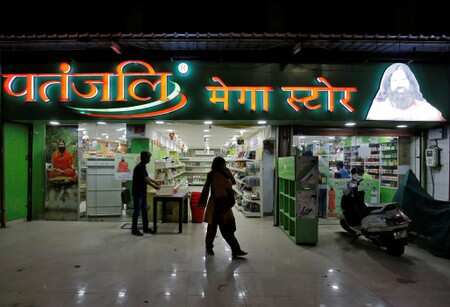Highlights
- Ramdev declared in 2017 that Patanjali's sales would more than double to Rs 20,000 crore ($2.84 billion) in the year to March 2018,
- But instead Patanjali’s sales plunged 10% to Rs 8,100 crore, according to its annual financial report,
 HARIDWAR: Three years ago, yoga guru and entrepreneur Ramdev was riding high.
HARIDWAR: Three years ago, yoga guru and entrepreneur Ramdev was riding high.The consumer goods empire he co-founded had tapped into a wave after the 2014 elections. Customers were snapping up Patanjali Ayurved’s affordable, Indian-made products such as coconut oil and ayurvedic remedies, in a mounting threat to foreign companies that had bet big on India.
“Turnover figures will force multinational companies to go for kapalbhati,” Ramdev declared in 2017, in reference to a yoga breathing exercise, vowing sales would more than double to Rs 20,000 crore ($2.84 billion) in the year to March 2018.
But instead Patanjali’s sales plunged 10% to Rs 8,100 crore, according to its annual financial report.
And in the last fiscal year, it likely deteriorated further, say company sources and analysts. Provisional data indicated sales of just Rs 4,700 crore in the nine months to December 31, CARE Ratings said in April, based on information from Patanjali.
According to interviews with current and former employees, suppliers, distributors, store managers, and consumers, Patanjali’s ambitions have been hobbled by missteps.
In particular, they highlight inconsistent quality as Patanjali expanded very quickly.
The company says its rapid expansion did bring some teething problems, but that they had been overcome.
Patanjali also suffered, like many others, from ban on high-denomination banknotes in 2016 and introduction of a new goods and services tax (GST) in 2017. The moves disrupted economic activity.
"Problems were expected"
Patanjali says it has 3,500 distributors that supply some 47,000 retail counters across India. Patanjali shops, mostly popular with rural Indians rising into the middle class, sell snacks like mango candy or ayurvedic remedies promising to cure joint pain.
Ramdev, a household name whose TV yoga shows are watched by millions, has been the public face of Patanjali since it was set up in 2006 and remains its brand ambassador - his bearded face smiles down from ubiquitous billboards and hoardings in villages.
But the company is owned by his business partner Acharya Balkrishna, who met Ramdev at a Sanskrit school three decades ago and holds 98.55% of Patanjali’s shares, according to a 2018 company filing.
The 46-year-old Balkrishna, whose net worth Forbes puts at $4.9 billion, brushed aside concerns about the company’s health during an April interview at one of Patanjali’s yoga centres near Haridwar.
“We suddenly expanded, we started three-four new units, and so problems were expected. We have solved that network problem,” said Balkrishna, referring to supply chain issues that affected deliveries. The problems were concentrated in “set-up and networking”, he said, without elaborating.
One ex-employee said issues included not having long-term deals with transporters, which complicated planning and increased costs. Patanjali executives also lacked the software needed to effectively track sales, another former worker said.
Balkrishna declined to give sales estimates for the current fiscal year or last but said future results would be “better”.
Reuters sent follow-up questions to Patanjali’s public relations officer KK Mishra, who said the queries had been forwarded to a special committee. Calls and messages to Balkrishna’s assistant about the queries went unanswered.
Third party suppliers
As Patanjali has ramped up its offering to more than 2,500 goods, it has prioritised scale over quality and farmed out production to third parties, which has dented quality, two former office executives and a supplier said.
In 2017, Nepal’s drug watchdog found that six Patanjali medical products had microorganism content above a maximum ceiling set by the regulator. Santosh KC, an official at Nepal’s Department of Drug Administration, said there were no problems with other Patanjali products.
Balkrishna denies there have been quality issues, noting that India’s national laboratories accreditation board has approved Patanjali’s central lab.
“Quality is not a problem,” Balkrishna said.
Patanjali products marketed as ayurvedic come under the regulatory purview of the Ministry of Ayush, created in 2014 to promote alternative therapies including Ayurveda. The ministry did not respond to a request for comment on Patanjali’s product quality.
Food regulator FSSAI, which oversees Patanjali’s processed foods, declined to disclose data on quality tests, saying it only did so in the event of safety concerns.
Balkrishna said only “a few products”, including wheat, pulses and rice, were sourced externally.